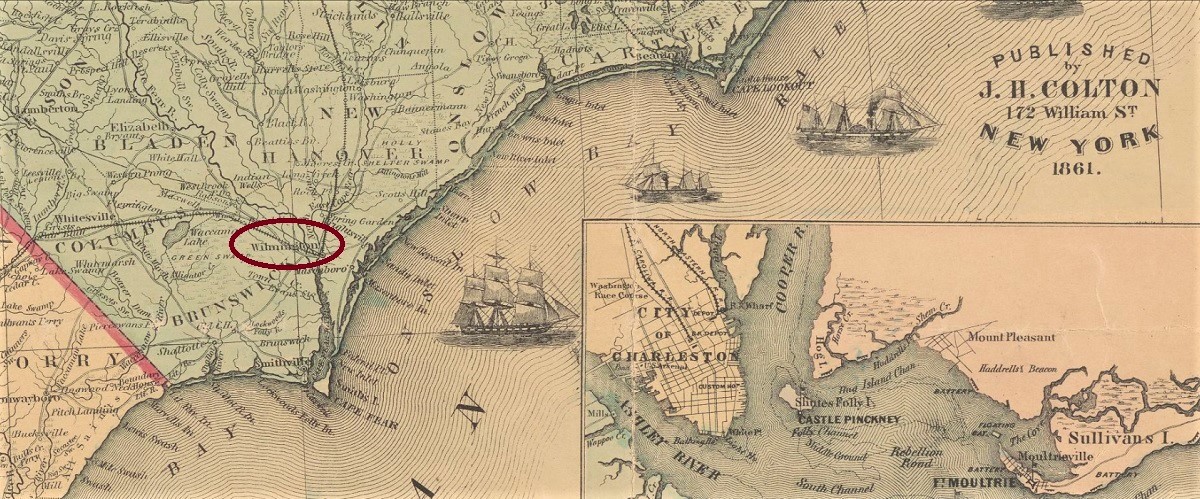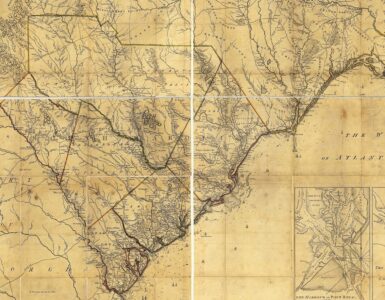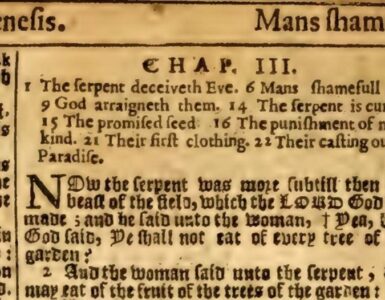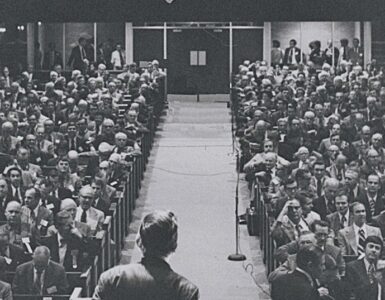Joseph Ruggles Wilson opened his committee report about beneficiary education with the paragraph that follows. Note that beneficiary is used to describe what would currently be called scholarships or charitable stipends to help “poor and pious youth” obtain an education for the ministry.
 There never has been a time, in the history of the Presbyterian Church, when there was serious difference of opinion touching the necessity of an educated Ministry. From the earliest period of her existence, she has, by every form of official action possible to such a testimony, uttered a distinct and emphatic voice in behalf of the highest standard of mental qualification on the part of those who were chosen to preach the Gospel from her sacred desks. Whilst, indeed, no Church has more strenuously insisted upon the unspeakable importance of healthy and vigorous piety in the pulpit; yet none has been more determined to possess a pulpit characterized by something more and better than the impatient zeal, the unguarded enthusiasm, and the heated impulses, in which mere vehemence of religious emotions is so apt, when left to itself, to waste its fires—a pulpit where saintly ardor of soul shall be tempered and directed by discipline of mind, breadth of knowledge, and accuracy of scholarship.
There never has been a time, in the history of the Presbyterian Church, when there was serious difference of opinion touching the necessity of an educated Ministry. From the earliest period of her existence, she has, by every form of official action possible to such a testimony, uttered a distinct and emphatic voice in behalf of the highest standard of mental qualification on the part of those who were chosen to preach the Gospel from her sacred desks. Whilst, indeed, no Church has more strenuously insisted upon the unspeakable importance of healthy and vigorous piety in the pulpit; yet none has been more determined to possess a pulpit characterized by something more and better than the impatient zeal, the unguarded enthusiasm, and the heated impulses, in which mere vehemence of religious emotions is so apt, when left to itself, to waste its fires—a pulpit where saintly ardor of soul shall be tempered and directed by discipline of mind, breadth of knowledge, and accuracy of scholarship.
The paragraph bears the marks of antebellum style, but the message is clear and is as applicable today as when it was presented to the General Assembly of the Presbyterian Church in the Confederate States of America meeting in Charlotte, North Carolina, 1864.
Joseph Ruggles was born the youngest son of James and Anne (Adams) Wilson, February 28, 1822, in Steubenville just west across the Ohio River from Pennsylvania. His father worked in the newspaper business, the Ohio legislature, and the judicial system as a judge. The Wilsons attended First Presbyterian Church where Joseph publicly professed faith in Christ at the age of eighteen. He prepared for college under the direction of Rev. John W. Scott at Grove Academy in Steubenville. Joseph then went southeast into Pennsylvania for studies in Jefferson College (currently Washington and Jefferson) and graduated with highest honors of the class of 1844. One of Wilson’s gifts that suited him particularly for pastoral ministry was facility as a speaker, skilled in rhetoric. For a short time after completing college he taught school in an academy in Mercer. Wilson began formal theological studies with a year in Western Seminary, Allegheny, but then moved east for the second year at Princeton Seminary in 1846. He did not complete the Presbyterian educational plan in Princeton but was licensed regardless by the Presbytery of Steubenville, June 23, 1847. Wilson’s truncated ministerial education is indicative of a problem common to the era for the Presbyterian Church in the United States of America (PCUSA) Old School–candidates were often granted licenses to preach without completing the full seminary curriculum as set forth by the General Assembly. It is ironic that the one who wrote the paragraph at the beginning of this biography did not complete his own program, but his concern for proper education of poor candidates may be indicative of lessons learned from his failure to complete all classes.
 Not long after Joseph and Janet “Jessie” Woodrow were married, he was ordained and installed pastor by Ohio Presbytery in the Chartiers Church in Pennsylvania, June 20, 1849. In conjunction with occasional pulpit supply ministry, Rev. Wilson taught rhetoric in Jefferson College for a year. By the time his call to Chartiers was dissolved by presbytery, January 15, 1851, the church had experienced significant increase in membership including twenty-five additions on profession of faith. From 1851 to 1855 he was professor of Chemistry and Natural Sciences in Hampden-Sydney College, Virginia. Ministers often showed interest in the developing fields of science and studied on their own for supplemental income or simply for pleasure. For example, Thomas Smyth of Second Church, Charleston, South Carolina, collected books about science and biology for edification and enjoyment. While at Hampden-Sydney, Wilson supplied the church in Walkers, Virginia. He was then pastor of First Church, Staunton, Virginia, from June 24, 1855 to October 8, 1857. During this call his son, Thomas Woodrow, was born in the manse, December 28, 1856. Tommy, as he was called, would become the twenty-eighth President of the United States.
Not long after Joseph and Janet “Jessie” Woodrow were married, he was ordained and installed pastor by Ohio Presbytery in the Chartiers Church in Pennsylvania, June 20, 1849. In conjunction with occasional pulpit supply ministry, Rev. Wilson taught rhetoric in Jefferson College for a year. By the time his call to Chartiers was dissolved by presbytery, January 15, 1851, the church had experienced significant increase in membership including twenty-five additions on profession of faith. From 1851 to 1855 he was professor of Chemistry and Natural Sciences in Hampden-Sydney College, Virginia. Ministers often showed interest in the developing fields of science and studied on their own for supplemental income or simply for pleasure. For example, Thomas Smyth of Second Church, Charleston, South Carolina, collected books about science and biology for edification and enjoyment. While at Hampden-Sydney, Wilson supplied the church in Walkers, Virginia. He was then pastor of First Church, Staunton, Virginia, from June 24, 1855 to October 8, 1857. During this call his son, Thomas Woodrow, was born in the manse, December 28, 1856. Tommy, as he was called, would become the twenty-eighth President of the United States.
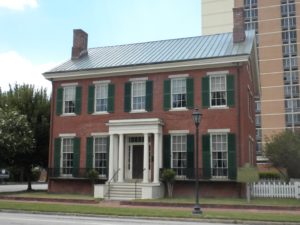 Wilson moved his household from Staunton to Augusta on the Savannah River in Georgia for his next call. The previous year Wilson was offered the call while visiting town to lead the wedding service for Felixina Baker of Milledgeville and his brother in law, James Woodrow (Janet Wilson’s brother). James was teaching science in Oglethorpe University and would go on to become the subject of controversy in Columbia Theological Seminary because of his views regarding science and the Bible. During the wedding visit, Wilson preached in First Church and the congregation was sufficiently impressed to issue a call that December. He accepted the new opportunity, delivered his first sermon to the congregation January 10, 1858, and was then installed May 2. At about the same time Oglethorpe University honored Wilson with the Doctor of Divinity. A few years later the family moved from the manse to the brick home shown in the photograph which is located across from the church. At the time of the move, Joseph and Janet had three children, Marion, Annie, and Thomas Woodrow. In 1867, a second son was born to the Wilsons, Joseph Ruggles, Jr.
Wilson moved his household from Staunton to Augusta on the Savannah River in Georgia for his next call. The previous year Wilson was offered the call while visiting town to lead the wedding service for Felixina Baker of Milledgeville and his brother in law, James Woodrow (Janet Wilson’s brother). James was teaching science in Oglethorpe University and would go on to become the subject of controversy in Columbia Theological Seminary because of his views regarding science and the Bible. During the wedding visit, Wilson preached in First Church and the congregation was sufficiently impressed to issue a call that December. He accepted the new opportunity, delivered his first sermon to the congregation January 10, 1858, and was then installed May 2. At about the same time Oglethorpe University honored Wilson with the Doctor of Divinity. A few years later the family moved from the manse to the brick home shown in the photograph which is located across from the church. At the time of the move, Joseph and Janet had three children, Marion, Annie, and Thomas Woodrow. In 1867, a second son was born to the Wilsons, Joseph Ruggles, Jr.
When the states seceded from the Union and the Civil War began, the Old School Presbyterians living in the Confederacy left the Old School PCUSA to form the Presbyterian Church in the Confederate States of America (PCCSA). The ecclesiastical secession was a response to the Old School having adopted the Gardiner Spring Resolutions during its 1861 General Assembly. The Resolutions, among other things, required an affirmation of allegiance to the Union which was obviously an oath the churches of the Confederacy would not take. On December 4, the first meeting of the General Assembly of the PCCSA convened in First Church, Augusta. B. M. Palmer was elected moderator and Joseph R. Wilson tallied the most votes for permanent clerk, a position he would hold until the end of the war. When the war ended, the PCCSA was renamed the Presbyterian Church in the United States (PCUS) with Wilson serving as stated clerk until 1898. The thirty-seven years from 1861-1898 may constitute the longest period anyone has served at the clerk’s desk for an assembly. In 1870 after a fruitful ministry despite the difficulties of the war and post-war years in Augusta, Wilson resigned to teach in the seminary in Columbia, South Carolina. While in Columbia, he earned additional income as interim pastor of First Church. The Wilson family’s home was conveniently located between the seminary and church about a half mile from each. The desire for a full-time minister at First Church combined with conflict at the seminary regarding mandatory student attendance of Sabbath chapel services contributed to Wilson’s decision to seek a new call.
 In 1874, Wilson left South Carolina to become pastor of First Church, Wilmington, North Carolina, beginning the first of November. During the Wilmington years he edited for a short time the North Carolina Presbyterian, but he he was not suited to editing a newspaper and was relieved when he removed his editor’s visor for the last time. In 1879 he was moderator of the PCUS General Assembly meeting in Louisville, Kentucky, and for his retiring moderator’s sermon the following year the Bible text was Psalm 118:25, “Save now, I beseech thee, O Lord: O Lord, I beseech thee, send now prosperity.” Application of his philosophy of ministry to the Wilmington congregation did not go well, so when an opportunity to return to education was offered, he accepted. The Wilsons moved west in 1885 across two states so he could teach in the short-lived Divinity School of Southwestern Presbyterian University in Clarksville, Tennessee. When he resigned in 1893, he also retired from active ministry.
In 1874, Wilson left South Carolina to become pastor of First Church, Wilmington, North Carolina, beginning the first of November. During the Wilmington years he edited for a short time the North Carolina Presbyterian, but he he was not suited to editing a newspaper and was relieved when he removed his editor’s visor for the last time. In 1879 he was moderator of the PCUS General Assembly meeting in Louisville, Kentucky, and for his retiring moderator’s sermon the following year the Bible text was Psalm 118:25, “Save now, I beseech thee, O Lord: O Lord, I beseech thee, send now prosperity.” Application of his philosophy of ministry to the Wilmington congregation did not go well, so when an opportunity to return to education was offered, he accepted. The Wilsons moved west in 1885 across two states so he could teach in the short-lived Divinity School of Southwestern Presbyterian University in Clarksville, Tennessee. When he resigned in 1893, he also retired from active ministry.
After a time residing in Columbia, he spent his final years in Princeton, New Jersey, where his son Woodrow’s family lived. Woodrow was president of Princeton University. Pastor Wilson’s health had been declining and at the time of his death he was suffering greatly. The Ohio born minister died in Woodrow’s home January 21, 1903. The next day several hundred undergraduates of Princeton University gathered at the railroad station in respect as they saw the train leave with the remains of Joseph Ruggles Wilson headed to South Carolina. He was buried in the churchyard of First Presbyterian Church, Columbia, next to Jessie who predeceased him April 15, 1888.
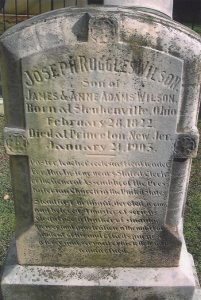 One of Wilson’s publications is The True Idea of Success in Life. An Address Delivered before the Union and Philanthropic Societies of Hampden Sidney College, June 10, 1857. The next year his discourse, Female Training: A Sermon delivered in the Union Church at Greensboro, Ga.: before the Friends of the Greensboro Female College, May 23, 1858 was published. The committee report quoted at the beginning of this biography was released as, Beneficiary Ministerial Education; The Substance of a Report Adopted by the General Assembly of the Presbyterian Church, in the Confederate States of America, at its Sessions in Charlotte, N.C., in May 1864. When the PCUS celebrated its twenty-fifth anniversary he delivered one of three commemorative lectures that were published in Memorial Addresses Delivered before the General Assembly of 1886 on the Occasion of the Quarter Centennial of the Organization of the Southern Assembly of 1861.
One of Wilson’s publications is The True Idea of Success in Life. An Address Delivered before the Union and Philanthropic Societies of Hampden Sidney College, June 10, 1857. The next year his discourse, Female Training: A Sermon delivered in the Union Church at Greensboro, Ga.: before the Friends of the Greensboro Female College, May 23, 1858 was published. The committee report quoted at the beginning of this biography was released as, Beneficiary Ministerial Education; The Substance of a Report Adopted by the General Assembly of the Presbyterian Church, in the Confederate States of America, at its Sessions in Charlotte, N.C., in May 1864. When the PCUS celebrated its twenty-fifth anniversary he delivered one of three commemorative lectures that were published in Memorial Addresses Delivered before the General Assembly of 1886 on the Occasion of the Quarter Centennial of the Organization of the Southern Assembly of 1861.
Barry Waugh
The map section in the header from an 1861 edition of Colleton’s atlas shows Wilmington, North Carolina, marked with an ellipse. The CDV photograph of Wilson is provided courtesy of Wayne Sparkman, director of the PCA Historical Center. Readers confused by the Presbyterian denominational names and abbreviations should see the notes at the end of the article on this site about John Leyburn, 1814-1893. Information on the Augusta manse and the Wilson children was located on the website for The Boyhood Home of President Woodrow Wilson; Rev. Wilson’s study is included among the rooms open to the public. Several bits of information regarding Wilson’s years at First Church, Augusta, were located in David B. Calhoun’s, Cloud of Witnesses: The Story of First Presbyterian Church, Augusta, Georgia, 1804-2004, which also provides on pages 55-84 a recount of Wilson ministry in Augusta. Dr. Calhoun’s Our Southern Zion: Old Columbia Seminary, 1828-1927, provided information regarding Wilson’s years in the seminary and First Church. The brief book, Chartiers Church and its Ministers. An Historical Address; by Rev. Francis J. Collier, delivered at the M’Millan Centennial Celebration Held at Chartiers Presbyterian Church, Near Canonsburg, Washington County, Pa., Philadelphia, 1875, was helpful. Regarding Woodrow Wilson, John M. Mulder’s Woodrow Wilson: The Years of Preparation. Wilson Supplemental Volumes, Princeton: University Press, 1978, is informative. The 1971 Ph. D. dissertation by Luke Joel Swabb, Jr., “The Rhetorical Theory of Rev. Joseph Ruggles Wilson, D.D,” for The Ohio State University, 308 pages, is available in PDF on the university site. The burial information is from The New York Times, January 22, 1903. One of Wilson’s seminary students at Southwestern whose biography has been posted on Presbyterians of the Past, Joshua Bohannon, was a member of the Choctaw Nation in Oklahoma.


